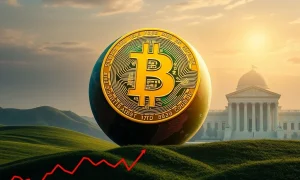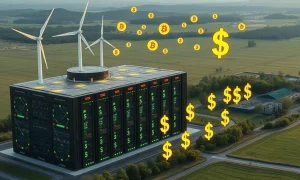The annual Jackson Hole Symposium represents a pivotal moment for global financial markets. It is not just another economic conference; it is a highly anticipated gathering. This exclusive event brings together central bankers, finance ministers, academics, and influential financial market participants. Understanding its implications is crucial for everyone, from seasoned investors to everyday consumers. Indeed, the discussions here often shape future economic policy, directly impacting your financial well-being.
What is the Jackson Hole Symposium?
The Jackson Hole Symposium is an annual conference of global central bankers and economists. The Federal Reserve Bank of Kansas City organizes this prestigious event. It consistently takes place in late August, nestled in the picturesque mountains of Jackson Hole, Wyoming. This unique setting provides a secluded environment for candid, high-level discussions. The meeting specifically gathers top economic minds from around the globe. They convene to discuss long-term policy issues, not immediate operational decisions. Historically, it has served as a critical forum for significant announcements. Policy shifts or forward guidance often emerge from these discussions. The primary focus remains on global economic challenges and the future direction of monetary policy. For instance, topics range from inflation targeting to financial stability.
The symposium’s origins trace back to 1978. Initially, it was a smaller gathering focused on agricultural policy. However, its scope broadened considerably over time. In 1982, then-Federal Reserve Chairman Paul Volcker famously attended. His presence elevated the symposium’s profile significantly. Since then, it has evolved into a must-attend event for economic leaders. The intimate setting encourages frank exchanges of ideas. Furthermore, it allows for deeper dives into complex macroeconomic theories. Participants often present research papers. These papers then become subjects of robust debate among attendees. This academic rigor distinguishes the Jackson Hole Symposium from other economic forums. It fosters a collective understanding of pressing economic issues.
Who Attends the Jackson Hole Symposium and Why It Matters
Distinguished figures from the world of finance and economics attend the Jackson Hole Symposium. Central bank governors from around the world are key participants. This includes the highly influential Chair of the U.S. Federal Reserve. European Central Bank presidents, Bank of Japan governors, and Bank of England officials also typically attend. Furthermore, finance ministers from major economies contribute their perspectives. Prominent academic economists, often Nobel laureates, present their groundbreaking research. Leading financial market analysts and strategists are also present, keenly observing the proceedings.
Their collective expertise fosters informed debate on critical economic matters. These attendees represent diverse global perspectives. They aim to tackle complex economic questions facing the world today. Their presence underscores the symposium’s global significance. Moreover, their insights can influence market sentiment. The opportunity for informal networking is also invaluable. Central bankers can discuss challenges face-to-face. This direct communication can sometimes facilitate international policy coordination. The roster of attendees ensures a comprehensive discussion. Consequently, the insights gained here often ripple through global financial systems. The opinions expressed by these key individuals can provide crucial signals to markets.
Key Discussions and Debates at the Jackson Hole Symposium
Monetary policy consistently dominates discussions at the Jackson Hole Symposium. Participants frequently debate inflation trends and their underlying causes. They also rigorously examine interest rate trajectories, both short-term and long-term. Global economic growth prospects are another major topic. Central bankers consider the impact of various policy tools on economic activity. These tools include quantitative easing, forward guidance, and interest rate adjustments. Discussions might cover financial stability risks, such as asset bubbles or systemic vulnerabilities. Furthermore, the future of central banking itself is often explored. This includes adapting to new technologies like digital currencies or addressing climate change’s economic implications.
Recent symposiums have seen discussions on topics like:
- Inflation dynamics: Understanding persistent price pressures and their sources.
- Labor market tightness: Analyzing wage growth and employment levels.
- Supply chain resilience: Addressing vulnerabilities in global supply networks.
- Fiscal policy interaction: How government spending and taxation interact with monetary policy.
- Global economic fragmentation: The impact of geopolitical tensions on trade and investment.
These conversations directly influence economic outlooks worldwide. They provide a framework for future policy decisions. Consequently, financial institutions and businesses closely monitor these debates. They seek to anticipate shifts in the economic environment. The symposium acts as a barometer for the collective thinking of global economic leaders.
The Jackson Hole Symposium’s Profound Impact on Markets and Your Finances
Decisions and insights from the Jackson Hole Symposium profoundly affect financial markets globally. Investors closely watch for clues about future monetary policy. A hawkish (favoring higher interest rates) or dovish (favoring lower interest rates) tone from central bankers can move markets dramatically. Stock prices, bond yields, and currency values react quickly to such signals. For example, an unexpected shift in rhetoric can trigger significant market volatility. Consequently, your investment portfolio might see immediate shifts. This applies whether you hold stocks, bonds, or even cryptocurrencies.
Consumers also feel the ripple effects, albeit indirectly. Changes in interest rates, for instance, influence borrowing costs across the economy. This directly affects mortgages, car loans, and credit card rates. A higher interest rate environment makes borrowing more expensive. Conversely, lower rates can stimulate spending and investment. Businesses also adjust their strategies based on these signals. They make decisions about expansion, hiring, and investment. Therefore, understanding the symposium’s outcomes is vital for personal financial planning. It helps you anticipate changes in your cost of living and investment opportunities. The Jackson Hole Symposium truly has far-reaching consequences for everyone.
Historical Precedent and Landmark Speeches at the Jackson Hole Symposium
Historically, the Jackson Hole Symposium has served as a crucial platform for major policy signals. These events often set the stage for significant shifts in global monetary policy. Former Fed Chair Ben Bernanke, for example, famously used the 2010 symposium. He hinted at the possibility of a second round of quantitative easing (QE2). This announcement significantly impacted financial markets at the time. It provided clear forward guidance to investors. Similarly, in 2020, then-Fed Chair Jerome Powell unveiled a significant shift. He announced a new flexible average inflation targeting framework. This signaled the Fed’s willingness to allow inflation to run higher. Such pronouncements often guide market participants’ expectations.
These landmark speeches provide clarity on central bank strategies. They also help to manage market expectations. For instance, a central bank might use the symposium to explain a new policy framework. This helps to ensure a smoother market transition. The world listens intently to these pronouncements. Analysts dissect every word, looking for subtle shifts in tone or policy direction. Such historical precedents highlight the meeting’s immense importance. They reinforce its role as a key indicator for global economic trends. The Jackson Hole Symposium therefore offers invaluable insights into the minds of the world’s most powerful economic leaders.
Navigating Future Economic Trends from the Jackson Hole Symposium
Looking ahead, the Jackson Hole Symposium will continue shaping global economic discourse. Policymakers will address emerging challenges that demand innovative solutions. These include adapting to rapid technological disruption, such as artificial intelligence’s impact on labor markets. They will also consider climate change’s economic effects, including transition risks and physical risks. Furthermore, geopolitical shifts and their implications for global trade and finance remain high on the agenda. The symposium offers a unique opportunity for global coordination on these complex issues. It allows for a collective brainstorming session among the world’s leading economic minds.
Its insights help businesses and individuals plan for the future with greater confidence. Companies might adjust their investment strategies based on discussions about global growth. Individuals might reconsider their savings plans in light of inflation outlooks. Staying informed about the symposium’s outcomes is therefore prudent for financial literacy. It provides a clearer picture of the evolving economic landscape. The Jackson Hole Symposium remains an essential event. It guides our understanding of the forces shaping tomorrow’s economy. Pay close attention to its proceedings each year for vital economic intelligence.
Ultimately, the Jackson Hole Symposium is far more than just an academic gathering. It stands as a critical event influencing global economic policy and financial markets. Its discussions and pronouncements affect businesses, investment strategies, and individual finances worldwide. By understanding its significance and following its key takeaways, you gain valuable economic foresight. This foresight empowers you to make more informed financial decisions. Therefore, mark your calendars and pay attention to its proceedings each year.
Frequently Asked Questions About the Jackson Hole Symposium
Q1: What is the primary purpose of the Jackson Hole Symposium?
A1: The primary purpose of the Jackson Hole Symposium is to bring together central bankers, economists, and financial experts from around the world. They discuss long-term policy issues affecting the global economy, aiming to foster deeper understanding and potential policy coordination.
Q2: Who typically attends the Jackson Hole Symposium?
A2: Attendees usually include central bank governors (like the U.S. Federal Reserve Chair, ECB President), finance ministers from major economies, prominent academic economists (often Nobel laureates), and leading financial market participants.
Q3: How does the Jackson Hole Symposium affect financial markets?
A3: Financial markets react strongly to signals about future monetary policy emerging from the Jackson Hole Symposium. Statements or speeches from influential central bankers can significantly influence stock prices, bond yields, currency values, and commodity prices, leading to market volatility.
Q4: Can the Jackson Hole Symposium impact my personal finances?
A4: Yes, indirectly but significantly. Policy discussions about interest rates, inflation, and economic growth can eventually affect borrowing costs for mortgages, car loans, and credit cards. They also influence investment returns and the overall cost of living, impacting your personal budget and financial planning.
Q5: Why is Jackson Hole chosen as the location for this important meeting?
A5: The remote and picturesque location of Jackson Hole, Wyoming, offers a secluded and private environment. This setting allows for more focused, candid, and uninhibited discussions among participants, away from immediate media scrutiny and the distractions of major financial centers.
Q6: Are major policy decisions officially made at the Jackson Hole Symposium?
A6: No, the Jackson Hole Symposium is not a decision-making body where official policy changes are enacted. Instead, it serves as a crucial platform where central bankers can signal potential shifts in monetary policy, explain new frameworks, or prepare markets for upcoming actions, often through key speeches.














